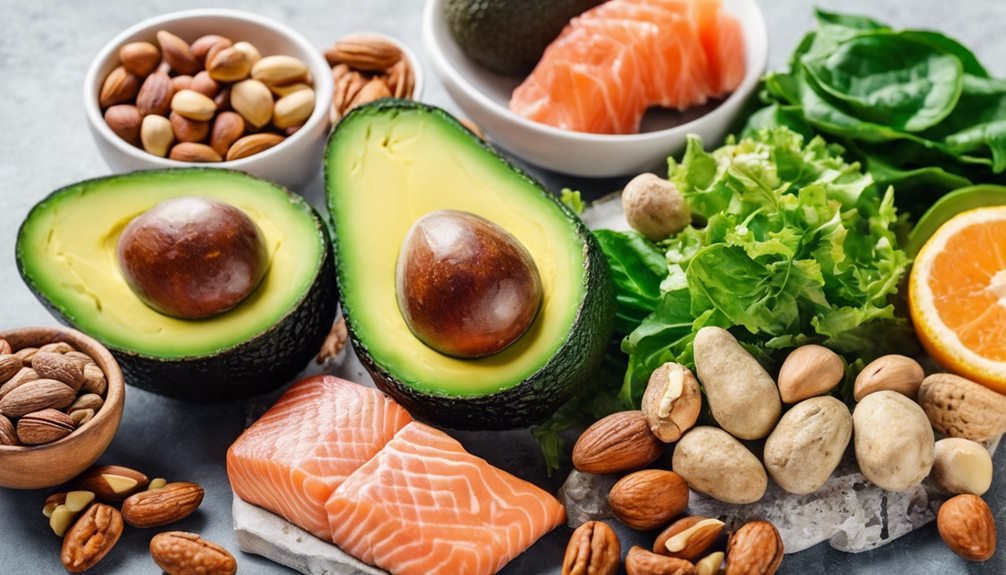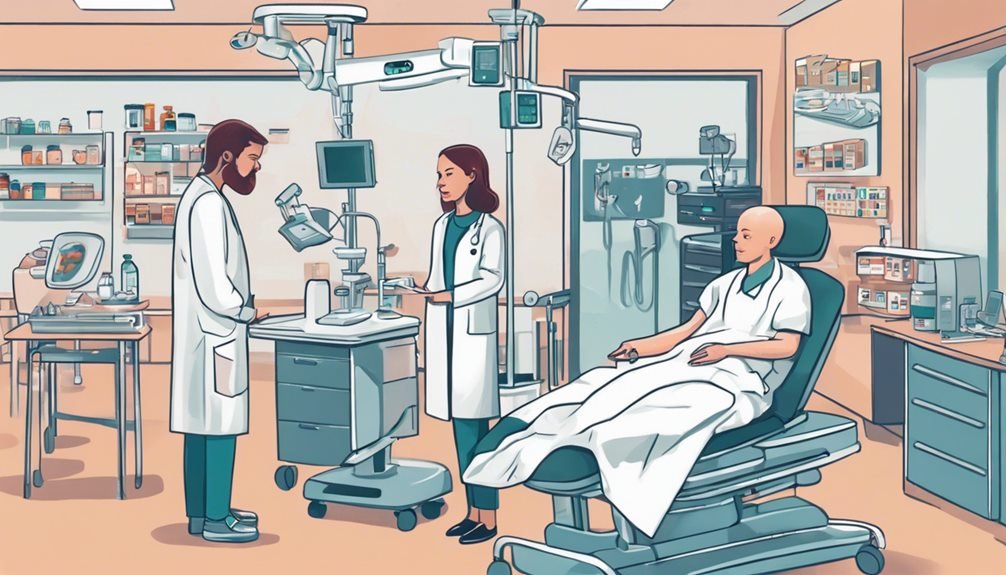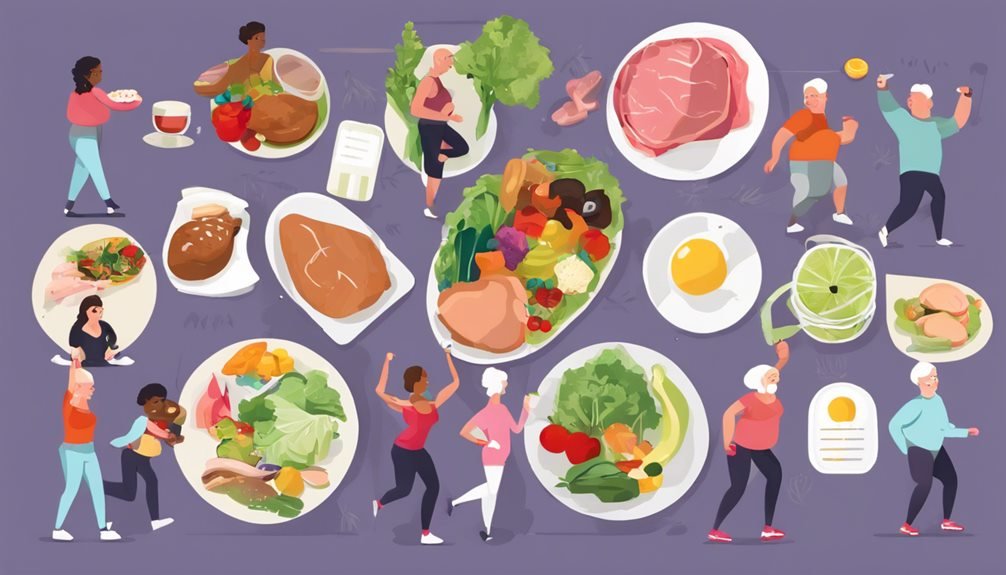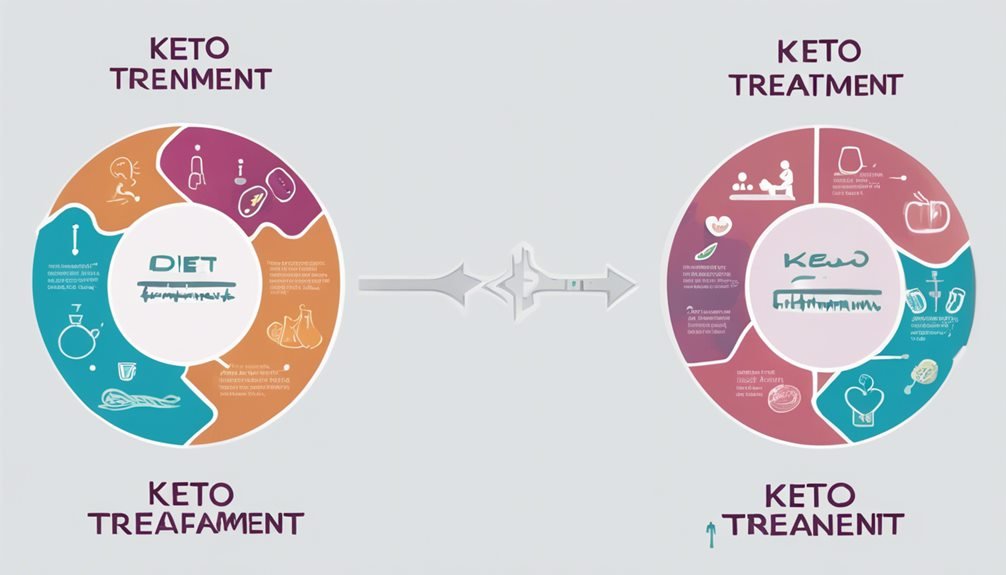As a cancer patient considering the keto diet, you may be intrigued by its potential benefits in managing your health. However, before making any dietary changes, it's important to understand the nuances and potential impacts this high-fat, low-carb approach can have on your well-being. From navigating nutrient deficiencies to understanding how it might interact with your treatment plan, there are key considerations to keep in mind. Stay tuned to discover the essential information that can help you make informed decisions about incorporating the keto diet into your cancer care journey.
Key Takeaways
- Consult healthcare team before starting keto.
- Understand potential risks and benefits.
- Gradual transition post-treatment recommended.
- Address possible nutrient deficiencies with supplements.
- Seek personalized nutrition plan for safety and efficacy.
Keto Diet Basics
If you're a cancer patient considering the keto diet, understanding the basics is crucial. Meal planning becomes a cornerstone of your journey towards optimal health. Start by focusing on whole foods rich in nutrients and healthy fats, such as avocados, nuts, seeds, and olive oil. Plan your meals to ensure you're meeting your nutritional needs while staying within the macronutrient ratios typical of the keto diet.
Grocery shopping becomes an essential task in this process. Make a list before heading to the store to avoid impulse purchases and stay on track with your dietary goals. Look for fresh produce, quality meats, and dairy products while avoiding processed foods high in sugars and unhealthy fats. By carefully planning your meals and shopping mindfully, you can set yourself up for success on the keto diet as a cancer patient. Remember, your health is a priority, and every step you take towards a balanced diet can make a significant difference in your well-being.
Cancer Metabolism Overview
Understanding cancer metabolism is crucial for cancer patients exploring dietary interventions like the keto diet. Metabolism regulation plays a significant role in tumor growth, as cancer cells have unique metabolic characteristics that differ from normal cells.
Unlike healthy cells that primarily rely on glucose for energy, cancer cells often exhibit increased glucose uptake and metabolism, known as the Warburg effect. This altered metabolism allows cancer cells to thrive in low-oxygen environments and sustain rapid growth.
Tumor growth is closely linked to the metabolic pathways cancer cells utilize to support their energy needs and proliferation. By targeting these metabolic vulnerabilities, researchers aim to develop therapies that specifically disrupt cancer cell metabolism while sparing normal cells.
The keto diet, which promotes a metabolic state called ketosis, has been theorized to potentially impact cancer cell metabolism. However, more research is needed to fully understand the implications of the keto diet on cancer metabolism and its potential role in cancer treatment.
Potential Benefits of Keto

Exploring the potential benefits of the keto diet may offer cancer patients valuable insights into alternative dietary approaches that could complement their treatment journey. Research findings suggest that the ketogenic diet, with its high fat and low carbohydrate content, may have potential benefits for cancer patients. Some studies indicate that the keto diet could help in managing blood sugar levels, reducing inflammation, and promoting weight loss, which are all factors that may positively impact cancer progression and treatment outcomes.
Patient experiences with the keto diet have also shown promising results. Many individuals have reported feeling more energetic, experiencing less fatigue, and even noticing improvements in their overall well-being while following a ketogenic eating plan.
While individual results may vary, these patient testimonials provide anecdotal evidence supporting the potential benefits of the keto diet for cancer patients.
Risks and Considerations
When considering the keto diet as a cancer patient, it's essential to be aware of the potential risks and important considerations associated with this eating plan. Side effects of the keto diet can include nutrient deficiencies due to restricted food choices, leading to potential impacts on overall health. Additionally, some individuals may experience symptoms like fatigue, constipation, and difficulty in maintaining the diet long term.
Long-term effects of the keto diet in cancer patients aren't yet fully understood, and there's limited research on its specific implications for cancer treatment outcomes. It's crucial to consult with your healthcare team before starting the keto diet, especially if you're undergoing cancer treatment. They can provide personalized guidance based on your individual health needs and treatment plan.
Remember that every cancer journey is unique, and what works for one person may not work for another. Prioritize your well-being by making informed decisions with the support of your medical team.
Impact on Treatment Efficacy

For cancer patients considering the keto diet, understanding its potential impact on treatment efficacy is crucial. When embarking on this dietary journey, one must carefully evaluate how it may influence treatment outcomes. Making dietary adjustments can have significant implications for the effectiveness of cancer therapies. Below is a table summarizing key points to consider:
| Impact on Treatment Efficacy | Key Considerations | Recommendations |
|---|---|---|
| Treatment Outcomes | Evaluate how keto may affect | Consult with healthcare professionals |
| the efficacy of current treatment | to align diet with treatment plan | |
| Dietary Adjustments | Understand the need for potential | Make gradual changes to the diet |
| modifications to support treatment | to minimize disruptions |
Nutritional Deficiencies
To ensure you're well-informed about the keto diet's impact on your health, it's important to consider the potential for nutritional deficiencies that may arise. When following a ketogenic diet, cancer patients should be aware of the need for certain supplements. Due to the restrictive nature of the keto diet, there's a higher risk of lacking essential nutrients like vitamins and minerals. Therefore, incorporating supplements can help bridge these nutritional gaps and support your overall health during treatment.
Additionally, some cancer patients may experience digestive issues when transitioning to a keto diet. This can include symptoms like constipation, diarrhea, or bloating. To address these concerns, it's crucial to consume an adequate amount of fiber, stay hydrated, and consider consulting with a healthcare provider or a dietitian for personalized advice.
Weight Management

Understanding how the keto diet can impact weight management is crucial for cancer patients seeking to optimize their health during treatment. Dietary modifications play a significant role in weight management while on the keto diet. By focusing on consuming healthy fats, lean proteins, and low-carb vegetables, you can support your body's weight goals. However, it's essential to monitor your caloric intake to ensure you're in a calorie deficit for weight loss or maintenance.
Incorporating an exercise regimen can further enhance weight management efforts. Regular physical activity not only aids in burning calories but also contributes to overall well-being. Whether it's light walking, yoga, or strength training, finding activities you enjoy can make a difference in managing your weight effectively.
Ketosis Monitoring
Monitoring your ketosis levels is a key aspect of following the keto diet as a cancer patient. To ensure you're in the optimal state of ketosis, it's important to regularly check your blood ketones and glucose levels. This can be done using various methods, such as blood ketone meters and glucose monitors.
Tracking your blood ketone levels helps you determine if you're effectively burning fat for energy, which is the primary goal of the keto diet. Ideally, your blood ketone levels should be between 1.5 – 3.0 mmol/L to indicate that you're in a state of ketosis.
Additionally, monitoring your glucose levels is essential to ensure they're within the recommended range. Keeping your glucose levels stable helps prevent spikes that can negatively impact your health.
Consultation With Healthcare Team

When considering the keto diet as a cancer patient, engaging in open communication and collaboration with your healthcare team is crucial. Making dietary adjustments while undergoing cancer treatment requires medical supervision to ensure your nutritional needs are met and to address any potential interactions between the diet and your treatment plan. Your healthcare team can provide guidance on how to safely implement the keto diet, taking into account your specific health condition and treatment regimen.
Consulting with your oncologist, registered dietitian, and other healthcare providers can help personalize a nutrition plan that supports your overall well-being during this challenging time. By working closely with your healthcare team, you can navigate the complexities of cancer treatment and dietary changes with confidence, knowing that you have a supportive network guiding you every step of the way. Trust in the expertise of your healthcare professionals to help you make informed decisions that promote your health and healing.
Personalized Nutrition Plan
For optimal support during your cancer journey, a personalized nutrition plan tailored to your individual needs is essential. When considering a ketogenic approach, take into account any dietary restrictions and lifestyle adjustments to ensure the plan aligns with your specific requirements. Here are some key aspects to consider:
- Detailed Dietary Assessment: Your healthcare team will conduct a thorough evaluation of your current diet, identifying any foods that may need to be limited or avoided due to your condition or treatment.
- Calorie and Nutrient Balance: Your personalized plan will focus on maintaining a balance of calories and essential nutrients to support your overall health and well-being during treatment.
- Meal Timing and Frequency: Lifestyle adjustments may include optimizing meal timing and frequency to enhance the effectiveness of your nutrition plan and support your energy levels.
- Regular Monitoring and Adjustments: Your healthcare team will continually monitor your progress and make necessary adjustments to your personalized nutrition plan to ensure it remains effective throughout your cancer journey.
Timing of Keto Adoption

To optimize the potential benefits of a ketogenic approach in managing your cancer journey, understanding the ideal timing for adopting this dietary strategy is crucial. Starting slowly is key when transitioning to a keto diet. Gradual adjustments allow your body to adapt more smoothly to the changes in macronutrient intake. It's essential to consult with your healthcare team before embarking on this journey to ensure it aligns with your overall treatment plan.
Beginning the keto diet during active cancer treatment may not be recommended due to the body's increased nutritional needs during this time. However, once your treatment is completed, and with the guidance of your healthcare provider or a registered dietitian, you can slowly introduce the ketogenic diet into your routine. This gradual approach can help minimize any potential side effects and allow your body to adjust more comfortably.
Support and Resources
Seeking support and accessing reliable resources are vital components of navigating the complexities of incorporating a ketogenic diet into your cancer journey. When embarking on this path, remember that you don't have to do it alone. Here are some ways to find the assistance you need:
- Support Groups: Joining a cancer or ketogenic diet support group can provide you with a network of individuals who understand what you're going through and can offer valuable advice and encouragement.
- Counseling: Consider seeking counseling from a mental health professional who specializes in helping cancer patients. They can assist you in coping with the emotional challenges that may arise during this process.
- Online Forums: Engaging with online forums dedicated to cancer and the ketogenic diet can connect you with a global community of individuals sharing similar experiences and insights.
- Community Resources: Explore local community resources such as nutritionists, dietitians, and cancer centers that can offer tailored guidance and support as you navigate the ketogenic diet alongside your cancer treatment. Remember, support is essential, and there are resources available to help you every step of the way.
Frequently Asked Questions
Can the Keto Diet Be Harmful for Cancer Patients?
The keto diet could be harmful for cancer patients as it may disrupt nutritional balance and impact the immune system. It's crucial to consult with healthcare providers before making dietary changes, especially during cancer treatment.
Ensuring you have a well-rounded diet that supports your body's needs is vital. Your medical team can provide guidance tailored to your specific situation to help you maintain optimal health and well-being throughout your cancer journey.
Will Keto Affect My Energy Levels During Treatment?
Hey there! So, when you're on the keto diet, managing fatigue during treatment is crucial. Keto can affect your energy levels as it alters your metabolism. By understanding how your body processes energy differently on this diet, you can adapt and optimize your nutrition to support your energy needs.
Remember to listen to your body, stay hydrated, and consult with your healthcare team for personalized advice on maintaining your energy levels while on keto.
How Can I Manage Digestive Issues on Keto?
To manage digestive issues on keto, try incorporating probiotic supplements and opting for low FODMAP options. Probiotics can help balance your gut flora, while low FODMAP foods reduce bloating and discomfort.
Consider foods like:
- rice
- bananas
- spinach
Stay hydrated and eat slowly to aid digestion. Experiment with portion sizes and keep a food journal to track triggers. Consulting with a dietitian can provide personalized guidance for your specific needs.
Is It Safe to Follow a Keto Diet Post-Treatment?
So, you're wondering if continuing with a keto diet after treatment is safe. Nutritional support post-treatment is crucial. While keto may have benefits, consider its long-term effects on your health.
Remember to consult your healthcare provider to ensure it aligns with your recovery journey. Your well-being is the priority, so make informed choices that support your overall health and healing process.
Can Keto Impact My Mental Health While Battling Cancer?
When battling cancer, keto may impact your mental health by affecting your cognitive function and brain health. However, emotional support and coping strategies can help ease these challenges. It's essential to prioritize your well-being by seeking guidance from healthcare providers and mental health professionals.
Engaging in activities that promote relaxation and mindfulness can also aid in maintaining a positive mindset during this difficult time. Remember, taking care of your mental health is just as important as your physical health.
Conclusion
In conclusion, remember that incorporating the keto diet into your cancer care plan can be beneficial, but it's important to consult with your healthcare team for personalized guidance. Did you know that a study found that cancer patients on a ketogenic diet experienced reduced tumor growth rates compared to those on a standard diet? By working closely with your healthcare professionals and monitoring your nutrition, you can navigate the complexities of the keto diet while managing your cancer treatment effectively.






